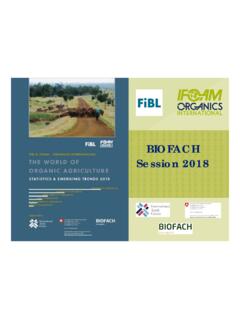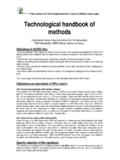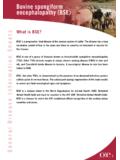Transcription of Master Thesis - orgprints.org
1 UNIVERSIT T HOHENHEIM Institute for Agricultural Policy and Markets Supervisor: Prof. Dr. Tilman Becker Master Thesis Consumer Attitude and Behaviour towards Organic Food: Cross-cultural study of Turkey and Germany Submitted by Nihan MUTLU Im Chausseefeld 5 70599, Stuttgart Stuttgart-Hohenheim, October 2007 i Acknowledgements My Master Thesis is based on the organic consumer research carried out by the Institute for Agricultural Policy and Agricultural Markets in University of Hohenheim, during the year 2007 in Germany. First and foremost, I m very grateful to my supervisor, Prof. Dr. Tilman Becker, who has offered an opportunity to study in his institute. My thanks are for his support, guidance, patience and encouragement. I would also like to thank to Prof. Dr. Sedef Akg ng r from Dokuz Eyl l University, Department of Economics, Izmir, Turkey, for her helps in guiding me for the Turkish part of my survey.
2 I m sincerely indebted to my friend Mehmet Ali Meral for his invaluable help in data collection, web page work and emotional support. Finally, I want to thank to my family; my mother Ass. Prof. Dr. Deniz Mutlu and my father M cahit Mutlu for their endless support and encouragement; additionally, all my Hohenheim friends in international Master programs for understanding and supporting me at every stage of my education life. Lastly, special thanks to all the organic consumers in Turkey and Germany who participated in my study by giving their precious time. ii Abstract Organic food market is very challenging in Europe and developing rapidly with different rates between western and eastern part. Consumers have raised great interest to healthy and tasty diet with high nutritional compounds, confidence in food safety, environmental and animal welfare concern and also sustainability.
3 This paper presents cross-cultural results for organic food consumers in Turkey and Germany. Quantitative data is collected by survey method consisting of structured questions which are only targeted to organic consumers in both countries and analysed with SPPS 13 for Windows statistical data package. Results shows that, in Turkish consumers age is lower, household and children number is higher and gender is more equally distributed than Germany. Similarly, both consumers have high level of education and belonging to middle income groups. In contrast, Germans have more experiences with organic food and buying frequency is more than Turkey. Majority of the Turkish and German respondents thought that organic food is healthy, contain high nutritional value and have positive image about organic production methods.
4 Certification as a compulsion is not well known among Germans, whereas, Turkish people have more problems in label recognition. Both in Germany and Turkey, supermarkets and organic retail shops will be the most preferred places and fresh fruits and vegetables will maintain their importance in the future market. Matured German market is not expecting big demand differences between products, whereas, some product categories especially meat products will burst-up in Turkish market. Cross-cultural consumer study shows that heath and supporting organic movement and sustainability are similarly standing on the top three places in the motivation list for Turkey and Germany, whereas high price and lack of availability reported as ruling barriers but with different degree of importance. iii Table of Contents i Abstract.
5 Ii Table of Contents .. iii List of Tables .. vi List of vii List of Abbreviations ..ix 1 Introduction .. 1 2 Literature Review .. 3 Worldwide Organic Agriculture ..3 Organic Agriculture in Europe ..4 Organic Agriculture in Turkey ..7 Legislation ..10 Marketing ..11 Organic Agriculture in Germany ..12 Legislation ..15 Marketing ..17 3 Consumer Attitude and 19 Consumer behaviour analysis ..19 Determinants of consumer analysis ..20 Internal factors affecting consumer behaviour ..21 Demographics and personal choices ..21 Consumer attitude ..22 Consumer Learning and Knowledge.
6 24 External factors affecting consumer behaviour ..25 Culture and Social class ..26 Family and Group Consumer Decision Process ..28 General attitude and behaviour of organic consumers ..30 Organic consumer identity ..31 Gender ..31 Age ..32 Presence of children ..32 Income ..33 Consumer motivation towards organics ..34 Health ..34 iv Environmental protection ..34 Animal welfare ..35 High quality ..36 Origin ..36 Taste ..37 Trust and food Consumer barriers towards organics ..38 Availability.
7 39 Appearance ..39 Organic product groups and consumers ..39 Turkish Consumer Studies ..40 German Consumer Studies ..42 4 Research Objectives .. 44 5 Hypothesis .. 46 6 Methodology .. 48 Questionnaire design ..49 Data Collection ..52 Conducting the results ..52 7 Results of the 53 Turkish organic Demographic Buying behaviour ..57 Preferences of the shopping places in Turkey ..59 Product preferences in Description of organic food and label knowledge in Turkey ..64 Turkish consumer attitude ..66 Motivations towards organic products ..66 Barriers towards organic products ..68 German organic consumers ..71 Demographic Buying behaviour.
8 75 Preferences of the shopping places in Product preferences in Description of organic food and label knowledge in German consumer s attitude ..84 Motivations towards organic products ..84 Barriers towards organic products ..86 8 89 Comparison of demographic Comparison of buying Comparison of shopping place Comparison of product preferences ..94 Comparison of organic food description and label knowledge ..96 Comparison of consumer motivations and barriers ..98 v 9 103 10 References .. 106 11 Appendix .. 112 Questionnaire in Questionnaire in Questionnaire in 12 136 vi List of Tables Table : European organic market Table : Turkey s export data: between 1998 - 2006 .. 12 Table : Organic producer associations in Germany.
9 15 Table : Label questions in the surveys ..50 Table : Variables in the questionnaire ..51 Table : Logo recognitions by Turkish organic consumers ..64 Table : Logo recognitions by German organic consumers ..80 Table : Comparison of ranking in shopping place preferences .. 89 Table : List of product choices and demands ..90 Table : Comperantion of overall ratings in organic food description ..93 Table : Comparison of motivations ..95 Table : Comparison of barriers .. 97 vii List of Figures Figure : Worldwide distribution of organically managed Figure : Organically managed land in Europe ..5 Figure : Development of organic farming in the European Union Figure : Map of Turkey with seven Figure : Number of products by years ..8 Figure : Organically managed area (ha) and producer numbers by years.
10 9 Figure : National organic logo examples of Figure : Organically managed land and farms by years ..13 Figure : Spatial distribution of organic farming in Germany in Figure : EU Labels for Germany and national logo: Figure : Model of Buyer Behaviour ..19 Figure : Three Elements of Consumer Analysis ..20 Figure : Motivation links needs and Figure : Maslow s pyramid: hierarchy of needs ..23 Figure : Schematic model of consumer decision process ..28 Figure : Types of marketing research Figure : Age distribution of Turkish organic Figure : Gender distribution of Turkish organic consumers ..54 Figure : Household distribution of Turkish organic Figure : Children distribution of Turkish organic Figure : Education level distribution of Turkish organic consumers ..55 Figure : Employment distribution of Turkish organic consumers ..56 Figure : Income distribution of Turkish organic Figure : Shopping responsibility in the Turkish household.










